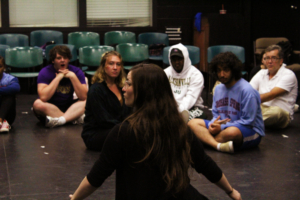BWW Blog: Collaboration, Inspiration, Creation

Something that every artist needs to learn is how to effectively collaborate. This could be anything from new work, to acting with a scene partner. Theatre is an extremely collaborative craft. Even the biggest one-person shows have a creative team, and many hands pulling many strings. This isn't a bad thing, however, because truly thought provoking work requires many different perspectives. Nothing is done alone, and if it is, then fix it. Much like the word "Team", there is no I in "Theatre". You also can't spell either without the word "Tea" but the deeper meaning in that I have yet to find out.
Currently, I am assistant directing Romeo and Juliet at Jacksonville University. We are extremely fortunate to have a great creative team, which has included two guest directors: one for dueling/ combat, and one for Intimacy/ Consent training. One of the most important things I think I have taken away from this production is watching our director hand the reins over to our guest directors. Retrospectively I am noticing it from past productions as well. Last February I was in Avenue Q, and our director had brought in a puppetry director.
What I am really starting to learn here is that there is absolutely no shame in not being able to do it all. Nobody can do it all. We all have different backgrounds, skillsets, and perspectives. Even if one director could direct the show, choreograph combat, workshop intimacy, etc. it wouldn't be a very multi-dimensional show would it? It would feel one-dimensional. I think a good director can acknowledge when they need to bring in a collaborator as opposed to thinking they can do everything.
All of this has gotten me interested in the world of devised theatre. Seeing these moments of collaboration and becoming interested in welcoming new perspective into my own work has hooked me into researching, what as of yet, is the most collaborative form of theatre there is. I spoke briefly with our Intimacy director for R&J about devised work, and she had told me that it's an umbrella term. There is so much that falls under the scope of devised work. Taking this into account devised work, at its core, is when without script or limitation a group of artists create a dramatic experience.
Last Fall, we touched on devised work in a directing class I took. My directing professor had given us instruction on Anne Bogart's Six Viewpoints Theory, which I will not get into right now, but then told us that she would leave the room until the last five to ten minutes of class. While she was gone, we were to devise a work using the viewpoints as instructed, and I can honestly say that this was a formative experience for me as an artist. I worked with the others in the class and we created something that we were proud of. The beauty of devised work is that it is completely one of a kind. It is molded and sewn together by the experiences and lives of those who are participating. It's terrifying, and exciting, and most importantly it's original.
In the world of performance, and artistry, and everything else of the like it would suit you well to collaborate. I think everybody puts pressure on themselves to know how to do everything but that's not what anyone should be focusing on. Do what you love and be great at them and share your skills with others that will share their skills with you. If all works as intended your collaborators should educate you and inspire you to do well in your own work. Let your collaborators influence you just as you'd like to influence them.
Videos


